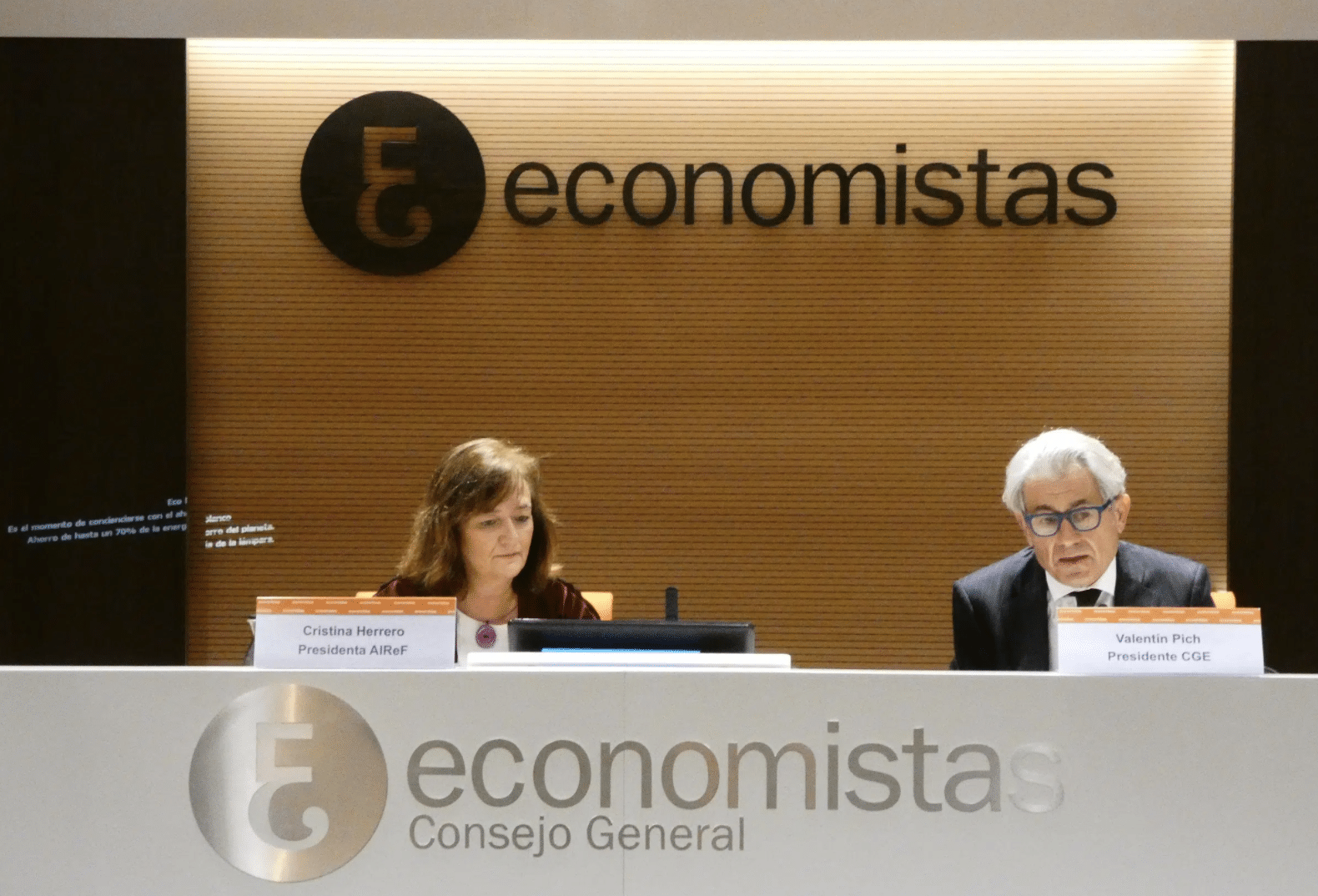Subheading: AIReF’s President believes a fiscal framework will need to be designed to meet new investment needs without jeopardising the sustainability of public finances
The President of the Independent Authority for Fiscal Responsibility (AIReF) stated today that, given the succession of external shocks that dominate the international scene, the EU and its Member States face the twofold challenge of optimising the resources channelled through the EU and defining a fiscal framework that will make it possible to adapt to this new scenario of investment needs and shocks without jeopardising the sustainability of public finances.
During her speech at the “Live Leaders” forum, organised by the Consejo General de Economistas [General Council of Economists], Cristina Herrero said that, since 2020, the global economic situation has been affected by a series of shocks that have led to a great deal of instability and uncertainty, such as the health crisis that began in 2020, the disruptions in value chains and the increase in the price of energy supplies in 2021, and the armed conflict in 2022.
These shocks have affected growth expectations for 2022. In fact, AIReF already lowered the growth forecast for 2021 and 2022 by 0.4 points in January. In this revision, AIReF took into account the impact associated with the resurgence of the pandemic in December, the supply crisis and the delay in the economic effects of the Recovery, Transformation and Resilience Plan (RTRP) in relation to previous estimates.
Revision of forecasts
AIReF is currently assessing the impact of the armed conflict in Ukraine in order to carry out a further revision of its macroeconomic and fiscal forecasts in the report on the Stability Programme Update, which is expected to be published in early May. According to AIReF, the conflict’s impact in Spain associated with commercial and financial exposure could be limited, but there is a high degree of vulnerability to a rise in energy prices. In addition, there are other possible channels of contagion, such as tourism or, indirectly, the greater commercial and/or financial exposure of some European partners.
In this context, both at a European and national level, it will be necessary to optimise the funds channelled through the EU, which represent unprecedented funding both in terms of their characteristics and their amount, as they total 750 billion (5% of EU GDP). Spain is one of the countries that benefits the most from the Next Generation EU (NGEU) funds, as it is the leading recipient of the Recovery and Resilience Facility, with €69.5bn. In addition, if we add the rest of the NGEU funds together with the other traditional EU funds, the disbursements amount to up to €35bn per annum in the period 2021-2023.
RTRP impact
AIReF forecasts that the impact of the RTRP on growth will be positive, but difficult to quantify and highly dependent on the pace of execution and the economic context. Up to January 2022, AIReF had assumed a high multiplier (1.2) and it adjusted the impact as a result of the pace of execution, which has been much lower than initially planned. In the report on the 2022 GSB last October, AIReF already revised downwards the estimate for 2021 and 2022. In the report on the Stability Programme Update, as Cristina Herrero pointed out, the institution will re-evaluate both the pace of execution and the multiplier.
Regarding the budgetary impact, AIReF believes that, despite accounting neutrality, in the long term the RTRP will have an impact on the underlying position of public finances and debt dynamics. Specifically, the RTRP will have a positive effect with a reduction in the debt of between three and six points in 2024. However, without a medium-term fiscal strategy, debt would remain on an upward path without stabilising.
In this context, governance and evaluation will be key to the effectiveness and efficiency of the funds, especially in a decentralised framework. In this regard, the President of AIReF highlighted that over 50% of the funds are managed by the Territorial Authorities and noted that some adjustments and redistributions may be inevitable to ensure their full absorption. The management of the funds, according to Cristina Herrero, is a major challenge for managers such as the Autonomous Regions, which are faced with managing REACT, traditional and RTRP funds within the same time period.
Reform of the European fiscal framework
Furthermore, the President of AIReF said that a fiscal framework will need to be designed to make it possible to adapt to this new scenario of investment needs and shocks without jeopardising the sustainability of public finances. A Commission proposal to reform the European fiscal framework was expected in 2022. In fact, AIReF contributed to the Commission’s Public Consultation on this reform. However, the armed conflict will probably postpone the debate, although the need to undertake a reform persists, and not only at a European level, but also at a national level.
According to Cristina Herrero, prevailing legislation in Spain suffers from deficiencies inherited from the European framework and those arising from the decentralisation model. It is a complex and unpredictable system, with a lack of a medium-term vision as it places little focus on debt and sustainability and is very much geared towards overseeing the Territorial Authorities.
In addition, it has unenforceable rules, lacks transparency and coordination and requires regulatory implementation to clarify concepts and methodologies. That is why she stated that it will be necessary to undertake a reform that will generate space to improve procedures and promote coordination between General Government authorities in order to have a shared fiscal strategy, which is necessary due to the particular vulnerability resulting from the high debt ratio.







